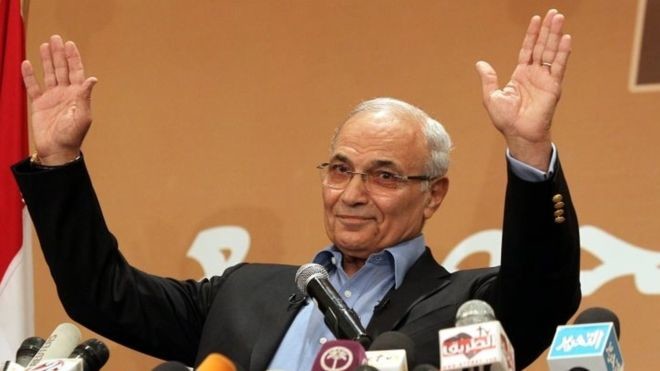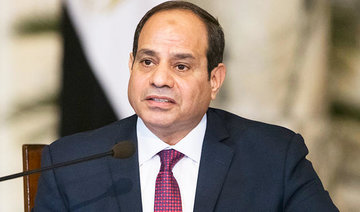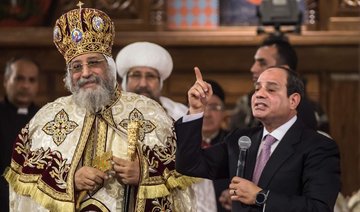CAIRO: The decision by Egypt’s former prime minister not to run in presidential elections deprives the race of its most serious challenger to Abdel Fattah El-Sisi.
Egypt will hold a presidential vote at the end of March, the election commission said on Monday.
While he has not yet announced his candidacy, El-Sisi is widely expected to stand and win the third presidential election in Egypt since the uprising that toppled Hosni Mubarak in 2011.
Ahmed Shafiq said on Sunday he would not be running — reversing a pledge that he would take part.
The ex-air force commander said he did not consider himself “the best person” to fill the position.
“Given that he came in second place in Egypt’s 2012 presidential race, I believe Shafiq was going to be a strong contender,” Amr Hashem, political analyst at the Ahram Center for Strategic Studies, said.
“He was a heavyweight candidate for many factors, and his presence could have made the election season a hot one. But due to all the pressure on him lately, his withdrawal was somehow expected.”
“With his withdrawal, it is likely that no other candidate would be able to potentially make a strong standing in competition with El-Sisi,” Justin Dargin, an expert on the Middle East from Oxford University, said.
After narrowly losing a presidential election to Muslim Brotherhood candidate Mohamed Mursi in 2012, Shafiq fled to the UAE where he has lived ever since and disappeared from Egypt’s political scene.
During that time, Shafiq was tried in absentia on corruption charges, but was eventually acquitted.
He returned to the limelight last month when he announced his intention to run in the elections and return soon to Egypt to start his campaign.
A few hours later, Al Jazeera aired a video in which Shafiq said he was not allowed to leave the UAE and criticized the UAE for meddling in Egypt’s affairs.
Despite claims by Shafiq’s lawyer and his party that the video was leaked to the Qatari-owned TV network, Shafiq was reportedly given 48 hours to leave the UAE.
His arrival in Egypt was surrounded by controversy and Shafiq took part in a phone interview with a popular TV show, during which he said he was OK.
His appearance on Al Jazeera placed him in hot water, with some accusing him of collaborating with the Muslim Brotherhood and Qatar, considered enemies of the Egyptian state.
The 76-year-old former aviation minister was the last prime minister to hold office under Mubarak.
Announcing on Twitter his decision to withdraw, he said that his time back in Egypt had led him to reconsider the decision.
“My absence of more than five years perhaps distanced me from being able to very closely follow what is going on in our nation in terms of developments and achievements despite the difficulty of the conditions,” he said.
“I have seen that I will not be the ideal person to lead the state’s affairs during the coming period. Thus, I have decided not to run in the upcoming 2018 presidential elections.”
“It was expected that he would reconsider his intention to run. There were several factors that played a role,” Dargin said.
“And, even if Shafiq did run, it appears that with the Egyptian body politic, he is not nearly as popular as El-Sisi, seeing that his years away from Egypt left him out of touch with the enormous changes that occurred since the revolution.
“It would be expected that even if Shafiq did run, El-Sisi would still dominate the polls because of his popularity and the respect garnered since he ascended to the presidency.”
Shafiq’s election withdrawal deprives El-Sisi of only serious rival
Shafiq’s election withdrawal deprives El-Sisi of only serious rival

Israel’s Netanyahu sends Mossad director to Gaza ceasefire talks in Qatar
It was not immediately clear when David Barnea would travel to Doha
JERUSALEM: Israeli Prime Minister Benjamin Netanyahu has approved sending the director of the Mossad foreign intelligence agency to ceasefire negotiations in Qatar in a sign of progress in talks on the war in Gaza.
Netanyahu’s office announced the decision Saturday. It was not immediately clear when David Barnea would travel to Qatar’s capital, Doha, site of the latest round of indirect talks between Israel and the Hamas militant group. His presence means high-level Israeli officials who would need to sign off on any agreement are now involved.
Just one brief ceasefire has been achieved in 15 months of war, and that occurred in the earliest weeks of fighting. The talks mediated by the United States, Egypt and Qatar have repeatedly stalled since then.
Netanyahu has insisted on destroying Hamas’ ability to fight in Gaza. Hamas has insisted on a full Israeli troop withdrawal from the largely devastated territory. On Thursday, Gaza’s Health Ministry said over 46,000 Palestinians have been killed in the war.
Gaza rescuers say eight dead in Israel strike on school building

- Agency spokesman Mahmud Bassal confirmed eight people, including two children and two women, were killed by Israeli shelling on the Halwa school
- The Israeli military, in a statement, acknowledged it conducted a strike on the facility
GAZA CITY, Palestinian Territories: Gaza’s civil defense agency said an Israeli air strike on a school-turned-shelter on Saturday killed eight people, including two children, while the Israeli military said it targeted Hamas militants.
Agency spokesman Mahmud Bassal confirmed eight people, including two children and two women, were killed by Israeli shelling on the Halwa school in the northern Gaza city of Jabalia.
Bassal said the strike wounded 30 people, including 19 children, and that the Halwa school housed “thousands of displaced people.”
The Israeli military, in a statement, acknowledged it conducted a strike on the facility.
It said the air force “conducted a precise strike on terrorists in a command-and-control center” that had previously served as the Halwa school in Jabaliya.
It said it targeted the premises because “the school had been used by Hamas terrorists to plan and execute attacks.”
The attack was the latest in a series of Israeli strikes on school buildings housing displaced people in Gaza, where fighting has raged for more than 14 months.
A strike on the United Nations-run Al-Jawni school in central Gaza on September 11 drew international outcry after the UN agency for Palestinian refugees, UNRWA, said six of its staff were among the 18 reported dead.
The Israeli military accuses Hamas of hiding in school buildings where thousands of Gazans have sought shelter — a charge denied by the Palestinian militant group.
At least 46,537 Palestinians, a majority of them civilians, have been killed in Israel’s military campaign in Gaza since the war began, according to data provided by the health ministry. The United Nations has acknowledged these figures as reliable.
The October 7 attack that triggered it resulted in the deaths of 1,208 people on the Israeli side, most of them civilians, according to an AFP tally based on official Israeli figures, which includes hostages killed in captivity.
Sudan army says entered key RSF-held Al-Jazira state capital

- The armed forces “congratulated” the Sudanese people in a statement on “our forces entering the city of Wad Madani this morning“
- A video the army shared on social media showed fighters claiming to be inside Wad Madani
PORT SUDAN: The Sudanese military and allied armed groups launched an offensive Saturday on key Al-Jazira state capital Wad Madani, entering the city after more than a year of paramilitary control, the army said.
The armed forces “congratulated” the Sudanese people in a statement on “our forces entering the city of Wad Madani this morning.”
Sudan’s army and Rapid Support Forces (RSF) paramilitaries have been at war since April 2023, leading to what the UN calls the world’s worst displacement crisis and declarations of famine in parts of the northeast African country.
A video the army shared on social media showed fighters claiming to be inside Wad Madani, after an army source told AFP they had “stormed the city’s eastern entrance.”
The footage appeared to be shot on the western side of Hantoub Bridge in northern Wad Madani, which has been under RSF control since December 2023.
The office of army-allied government spokesman and Information Minister Khalid Al-Aiser said the army had “liberated” the city.
With a months-long communications blackout in place, AFP was not able to independently verify the situation on the ground.
“The army and allied fighters have spread out around us across the city’s streets,” one eyewitness told AFP from his home in central Wad Madani, requesting anonymity for his safety.
Eyewitnesses in army-controlled cities across Sudan reported dozens taking to the streets celebrating the army offensive.
In the early months of the war between the army and the RSF, more than half a million people had sought shelter in Al-Jazira, before a lightning offensive by paramilitary forces displaced upwards of 300,000 in December 2023, according to the United Nations.
Most have been repeatedly displaced since, as the feared paramilitaries — which the United States this week said have “committed genocide” — moved further and further south.
The war has killed tens of thousands and uprooted more than 12 million overall, more than three million of whom have fled across borders.
Franco-Algerian influencer to stand trial in March

- A diplomatic row between France and Algeria has flared up over the arrests of several Algerian social media influencers accused of inciting violence
- Sofia Benlemmane, a Franco-Algerian woman in her fifties, was arrested on Thursday
LYON: A Franco-Algerian influencer, arrested as part of an investigation into online hate videos, appeared before French prosecutors on Saturday and will stand trial in March, authorities said.
A diplomatic row between France and Algeria has flared up over the arrests of several Algerian social media influencers accused of inciting violence.
Sofia Benlemmane, a Franco-Algerian woman in her fifties, was arrested on Thursday.
Followed on TikTok and Facebook by more than 300,000 people, she is accused of spreading hate messages and threats against Internet users and against opponents of the Algerian authorities, as well as insulting statements about France.
She was ordered to appear before a criminal court on March 18, the public prosecutor’s office said.
She is being prosecuted for a series of offenses including incitement to commit a crime, death threats and “public insult based on origin, ethnicity, nation, race or religion.”
The blogger had insulted a woman during a live broadcast in September, shouting “I hope you get killed, I hope they kill you.”
Her lawyer Frederic Lalliard argued that Benlemmane had committed no criminal offense, even though her comments “may irritate or shock.”
Benlemmane, a former football player, made headlines in 2001 when she was given a seven-month suspended prison sentence for entering the Stade de France pitch outside Paris with an Algerian flag during a France-Algeria friendly match.
Although she was firmly opposed to the government in Algiers in the past, her views have since changed and she now supports the current authorities in Algeria.
Several other Algerian influencers have been the target of legal proceedings in France for hate speech.
Former prime minister Gabriel Attal said that France should cancel a 1968 accord with Algeria that gives Algerians special rights to live and work in France because of the dispute over what he called “preachers of hate.”
Algeria won independence from France in 1962 after a seven-year war.
Health ministry in Hamas-run Gaza says 32 killed in 48 hours

- The ministry said at least 109,571 people have been wounded in more than 15 months of war
- The ministry of health added 499 deaths to its death toll on Saturday
JERUSALEM: The health ministry in Hamas-run Gaza said on Saturday that 32 people were killed in the Palestinian territory over the past 48 hours, taking the overall death toll to 46,537.
The ministry said at least 109,571 people have been wounded in more than 15 months of war between Israel and Hamas, triggered by the Palestinian group’s October 7, 2023 attack.
The ministry of health added 499 deaths to its death toll on Saturday, specifying they have now completed the data and confirmed identities on files whose information was incomplete.
A source in the ministry’s data collection department told AFP that all the 499 additional deaths were from the past several months.
The number of dead in Gaza has become a matter of bitter debate since Israel launched its military campaign against Hamas in response to the Palestinian militant group’s unprecedented attack last year.
Israeli authorities have repeatedly questioned the credibility of the Gaza health ministry’s figures.
But a study published Friday by British medical journal The Lancet estimated that the death toll in Gaza during the first nine months of the Israel-Hamas war was around 40 percent higher than recorded by the health ministry.
The new peer-reviewed study used data from the ministry, an online survey and social media obituaries, but only counted deaths from traumatic injuries. It did not include those from a lack of health care or food, or the thousands of missing believed to be buried under rubble.
The UN considers the Gaza health ministry’s numbers to be reliable.



















